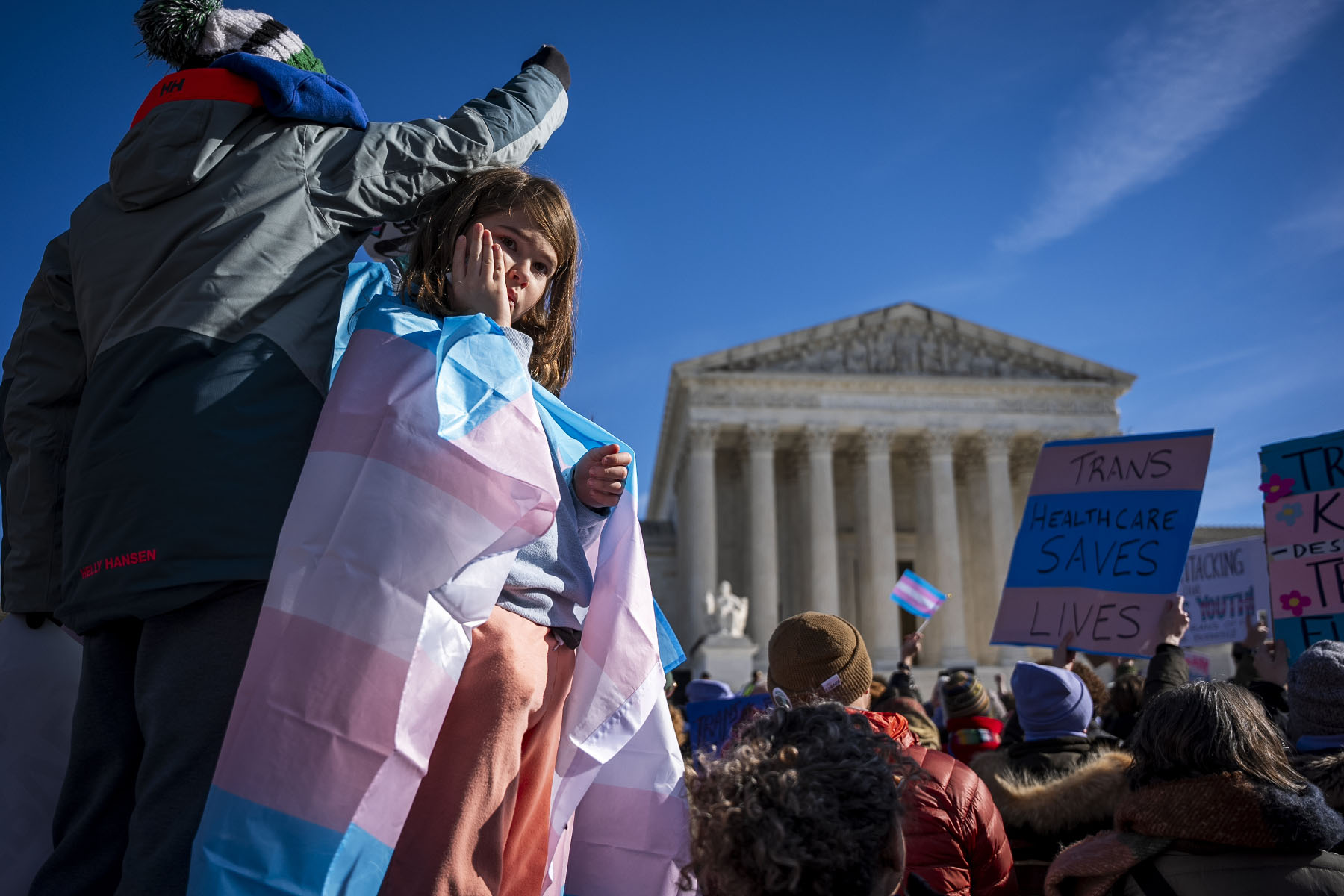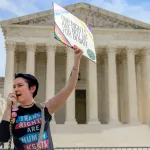The Supreme Court on Wednesday ruled that Tennessee’s ban on gender-affirming care for transgender youth should remain in place. The court found that Tennessee’s law restricting certain medical treatments for trans minors does not violate the 14th Amendment’s equal protection clause — a finding that experts worry will set new precedent for how transgender people can be treated under the U.S. Constitution.
This 6-3 opinion, signed by Chief Justice John G. Roberts Jr., will further restrict a form of health care that has been increasingly banned for transgender youth across the country, both by Republican state lawmakers and by the Trump administration. Twenty-five states ban hormone replacement therapy and puberty blockers for trans youth, as well as surgeries, which are rare for minors; two other states ban only surgeries. Of those 25 states, six have made it a felony for medical providers to administer gender-affirming care, according to the Movement Advancement Project, which tracks LGBTQ+ policy.
Roberts wrote that “the voices in these debates raise sincere concerns; the implications for all are profound.” He emphasized, however, that the court’s role is to ensure that the law does not violate the equal protection clause. “Having concluded that it does not,” he added, “we leave questions regarding its policy to the people, their elected representatives, and the democratic process.”
The Supreme Court’s ruling was narrower than it could have been, attorneys with the ACLU and Lambda Legal said in a call with reporters on Wednesday. This narrow scope precludes some of the broader consequences that could have come from Wednesday’s ruling and provides them with other avenues to challenge anti-trans laws, they said.
The court did not address whether Bostock v. Clayton County, the Supreme Court case that found LGBTQ+ people are protected against workplace discrimination, reaches beyond Title VII into areas like health care. The court also did not weigh on whether trans people broadly constitute a suspect class — meaning, if they have been historically subject to discrimination and therefore receive extra protections against discrimination under the Constitution. The justices were also clear that their decision only applies to gender-affirming care for minors.
Although this case impacts specifically Tennessee, the Supreme Court has now signaled that it does not plan to intervene when other states restrict medical care for trans youth. This may embolden more states to ban the care and it could also complicate ongoing lawsuits against current state bans. At least 110,000 transgender youth already live in states that restrict or limit gender-affirming care access, according to the Williams Institute at UCLA School of Law. Many families of trans kids have left these states to find health care elsewhere — and so have the doctors providing it.
Hormone replacement therapy (HRT) is used by many trans people to treat gender dysphoria, which is a strong and persistent distress felt when one’s body is out of sync with their identity. Without treatment, gender dysphoria can severely and negatively impact day-to-day life. HRT is also used to treat menopause and conditions like polycystic ovary syndrome. However, its use specifically to treat gender dysphoria in trans people, and particularly trans youth, is what has come under intense political scrutiny in the past five years.
Justice Sonia Sotomayor, one of three justices to vote against upholding Tennessee’s ban, wrote: “[The Court] authorizes, without second thought, untold harm to transgender children and the parents and families who love them. Because there is no constitutional justification for that result, I dissent.”
Opponents of gender-affirming care say that teenagers starting hormone replacement therapy — and pre-pubescent children taking puberty blockers — are too young to make these medical decisions. However, opponents often inaccurately portray the care as rushed, sloppy or even akin to mutilation. To obtain gender-affirming care, a young trans person works with their parents and doctors over the course of months or years to prove that medical intervention is right for them. Medical providers stress that there is not a “one-size-fits-all” approach and that side effects, like the risk of decreased bone density when taking puberty blockers, are closely monitored and communicated to patients.
In Tennessee, many families of transgender youth are discussing moving out of the state or out of the country, based on the state’s gender-affirming care ban as well as President Trump’s executive orders targeting transgender people, said Lucas Cameron-Vaughn, a senior staff attorney with ACLU of Tennessee. Other families have been traveling out of state to obtain gender-affirming care for their children, he said, which means taking time off of work, taking kids out of school, and spending money that they may or may not have.
The ruling comes in the middle of Pride month, an annual celebration of LGBTQ+ life and history. Past blockbuster LGBTQ+ rights decisions have historically fallen in mid to late June, but those have largely extended civil rights protections. Lawrence v. Texas, which struck down sodomy laws, was released June 26, 2003. The Windsor decision, which repealed the federal ban on marriage equality, was decided June 27, 2013, and the Obergefell ruling that granted same-sex couples the right to marry two years later came out June 26. The Bostock decision, which found that sex protections for women applied to LGBTQ+ people in the workplace, was released June 15, 2020.
But two years ago, on June 30, the court ruled that the state of Colorado could not force a website designer to serve LGBTQ+ couples seeking wedding websites. And again on Wednesday, the court veered from extending rights to LGBTQ+ people during Pride month to taking them away.
Major medical groups including the American Medical Association, American Psychological Association and the American Academy of Pediatrics have endorsed the use of gender-affirming care for transgender youth. The new president of the World Professional Association for Transgender Health, which sets global standards for doctors and nurses providing health care to trans patients, has expressed concerns that banning gender-affirming care will simply drive the care underground and endanger patients.
The decision on Wednesday upholds the 6th U.S. Circuit Court of Appeals’ conclusion in 2023, which allowed Tenneesse’s ban to take hold over a statewide injunction. This case began in April 2023 as L.W. v. Skrmetti, when the ACLU and Lambda Legal sued Tennessee — via the state’s attorney general, Jonathan Skrmetti — to block the state’s health care ban. Attorneys filed the lawsuit on behalf of Samantha and Brian Williams of Nashville and their teenage daughter, two other families of trans youth and Dr. Susan Lacy, a Memphis-based gynecologist providing gender-affirming care to adults and minors.




